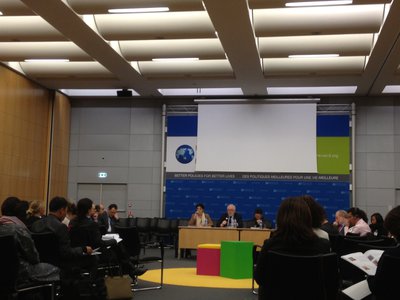6 Dec 2013
Reports/ Presentations
Losada, Rosa Maria
,
Panizzon, Marion
Strengthening the Migration-Development Nexus through Improved Policy and Institutional Coherence

by Prof. Marion Panizzon and Rosa Maria Losada
Better policies for better lives
Migration has become a defining issue for development. There are over 200 million international migrants and many more internal migrants in the world. In the coming decades, demographic imbalances, persistent income disparities, declining communication and transportation costs, and increased access to information will continue to drive migration worldwide. South-South migration will probably grow even more, and in some parts of the world climate change will have the potential to displace large sections of the population.
With the recognition that migration has an important impact on development in countries of origin and destination alike, the Global Knowledge Partnership on Migration and Development (KNOMAD), an initiative coordinated by the World Bank, has been established and envisaged as a platform for synthesizing and generating knowledge and policy expertise around migration and development issues.
Public policies play a crucial role in maximizing the benefits and minimizing the costs of migration, both in countries of origin and destination. Yet, when designing policies that aim to regulate migration flows, integrate immigrants and optimize the impact of migration on development, policy makers need to consider the interactions between migration policies and other public policies in order to better identify related development outcomes.
On 4-5 December 2013, the workshop “Strengthening the Migration-Development Nexus through Improved Policy and Institutional Coherence”, organized by KNOMAD’s Thematic Working Group on Policy and Institutional Coherence, gathered experts from OECD and non-OECD countries, as well as representatives from international and civil society organizations, with the purpose of exploring research needs and gaps related to policy and institutional coherence in the area of M&D. The workshop served as a crucial step in agreeing on a conceptual framework and mapping out the future research agenda for KNOMAD’s five-year implementation phase, and included five moderated sessions: 1) Understanding policy and institutional coherence; 2) Defining and measuring policy and institutional coherence for M&D; 3) Sharing experiences and understanding challenges; 4) Identifying and prioritizing knowledge gaps and research needs; and 5) Towards a roadmap for implementing a policy-relevant research agenda on coherence for M&D.
The conference on M&D policy and institutional coherence was a highly motivating and insightful event. Thanks to all participants for making it such a wonderful experience and offering so many opportunities for exchange.
The NCCR was represented by Prof. Marion Panizzon and Rosa Maria Losada, doctoral research fellow from the WP4.
On behalf of the WTI & NCCR Trade Regulation Prof. Marion Panizzon and Rosa Maria Losada took part in the design of the concept of policy coherence with personal opinion notes. Furthermore they are planning to conduct a case study on FTA/RTAs and migration policy. It will draw upon Prof. Panizzon’s previously published paper in the Journal of World Trade in 2011, updating it with newer case studies of EPA/RTA/FTA and by adding the perspective of policy coherence, in particular between trade and migration policies.
Follow-up
In view of an upcoming NCCR WP4 Doctoral Programme Conference in 2014 on the nexus of migration, development, trade and policy coherence, several promising discussions have taken place with many experts and specialists in the field, particularly with François Crépeau, United Nations Special Rapporteur on the Human Rights of Migrants (2011-2014), Sonia Plaza, Senior Economist at the World Bank, in its Poverty Reduction and Economic Management (PREM) Economic Policy, Debt and Trade Department, and also with the Chargé de Mission at the cabinet of the Secretary of State for Migrations and Tunisians Abroad, Khalil Amiri.
Research gaps
Many gaps could be identified during the debate. Especially Prof. Nasra Shah, Professor of Demography at the Department of Community Medicine and Behavioral Sciences at the Faculty of Medicine, Kuwait University, pointed out the missing data on the stocks and flows of migration from the various countries to the Gulf. Data on the migrants’ duration of residence in the Gulf, the gender dimension with a focus on domestic workers and even the various steps involved in employment of migrant workers in the Gulf require a more comprehensive description than exists at present. Additionally throughout the debate it was promoted to more mainstream migration into national development plans and highlighted that in Europe migration policies were developed in the Schengen process with a tendency to forget the rights of irregular migrants. It was concluded that more research based analysis is needed particularly for more evidence based policy design.
After the workshop: Conference on M&D and seminar with Paul Collier:
"Interrelations between Public Policies, Migration and Development”
On 5-6 December, Prof. Marion Panizzon and Rosa Maria Losada also attended the Conference "Interrelations between Public Policies, Migration and Development” organized by the OECD Development Centre for its project “Interrelations between public policies, migration and development of partner countries: case studies and policy recommendations”. Co-funded by the European Commission, this project aims to enhance the capacity of partner countries to incorporate migration into the design and implementation of their development strategies and other public policies. The conference gathered policy makers and researchers from the partner countries involved in the project. During this session, the conceptual framework of the project was discussed.
Seminar with Professor Paul Collier on his recently published book Exodus: How Migration is Changing Our World
On December 6, Prof. Marion Panizzon and Rosa Maria Losada also attended the Seminar organized by Professor Paul Collier, Director of the Centre for the Study of African Economies at the University of Oxford, where he also presented his recently published book “Exodus: How Migration is Changing Our World”. Prof. Collier lays out the effect of migration on poor societies, pointing out that poor countries will catch up not thanks to emigration but to globalization. As alternatives to migration his proposition as drivers are trade, capital movement and the flow of ideas.
More information:
KNOMAD: www.knomad.org
Agenda workshop: http://www.knomad.org/powerpoints/policy_coherence/Agenda_KNOMAD_workshop.pdf
Strengthening the Migration-Development Nexus through Improved Policy and Institutional Coherence

